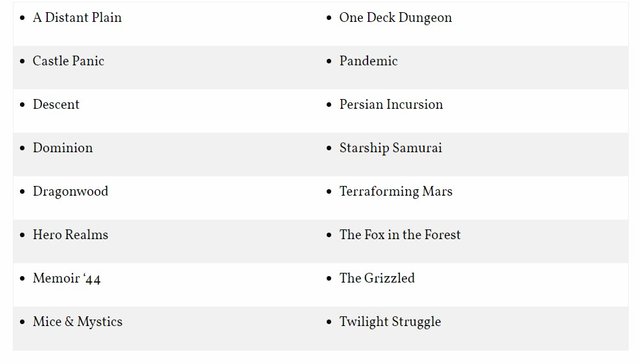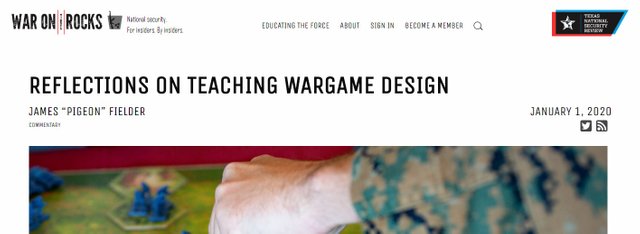-- https://warontherocks.com/2020/01/reflections-on-teaching-wargame-design/
One of the things that I love most about role-playing games is that they are just a specific manifestation of a wider "wargaming" tradition that well precedes them. Anyone familiar with the history of role-playing games in their modern incarnation, often traced back to Gary Gygax and his merry band of mad men playing a derivative of Chainmail (though other games that involved individuals taking on a role to play out a story without specific miniatures or tabletop representations certainly existed before then), nose of the classic Kriegspiel and other sand table experiences which inform their design.
Because of that, it's often useful to be aware of how military wargaming is evolving because there are ideas there absolutely worth bringing back into the liminal space we inhabit. One way or another, all of these games share an extremely primal, basic element:
Human beings.
And that brings us to War on the Rocks, and absolutely fabulous military-focused blog which often comes up in my feeds. Starting the year talking about teaching military cadets about the process of designing wargames which are elemental to their experience is good for us.
I can almost guarantee that every person reading this post things of themselves as, to some degree, a role-playing game designer. We have already moved beyond the hump, whether it be at the small-scale ("well, maybe we just need a little house rule here") or the large ("and here's my 325 page fully developed game that you can buy on RPGNet"). Most of us have more than a little experience with a variety of games. While the number of people who have only played Dungeons & Dragons remains at a disturbingly high level, the knowledge that there are games well beyond that scope that do different things and provide different experiences is also spreading. Every single person who realizes that there are games beyond the first game that they ever played is one more person who joins our ranks and recognizes that they, too, could design a game that gives them and their friends a new experience.
There is a wide gap between knowing that you can and knowing how, and that brings us back to this blog post. Look at the list of games that Fielder provided to his students as inspirational examples.

That is pointedly not a list of pure wargames. In fact, many of them are effectively role-playing games.
When you are looking to teach yourself how to create games, you can't restrict your vision to a single example. On top of that, you can't restrict your experience to a single example. If nothing else, you need to reach out beyond what you are comfortable with and determine what you don't like. You need to be open to the experience of finding out what you don't want to do – or finding things that you enjoy doing but which don't fit what you want to accomplish in your game.
Every single one of us is learning to design games simply by playing games, enjoying games, by making games part of our lives. Take the time to check out games beyond what you would normally consider from inspirations you wouldn't normally expect.
In the long term, it will make you a better designer, a better player, and potentially a better person.
No promises on that last one, but it's worth a shot.
Happy New Year and welcome to the first day of 2020 (the second day for some of you) and hopefully the first of many posts to the Tabletop Role-Playing community. While Communities are still in beta, at the moment they provide an easy way to collect posts on a single subject. Please feel free to join the Community by going to the root site (https://beta.steemit.com/trending/hive-194041) and let us know if you have something to add.

This post was shared in the Curation Collective Discord community for curators, and upvoted and resteemed by the @c-squared community account after manual review.
@c-squared runs a community witness. Please consider using one of your witness votes on us here
Downvoting a post can decrease pending rewards and make it less visible. Common reasons:
Submit